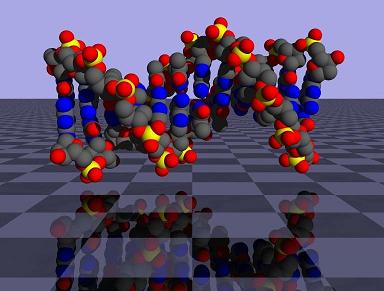|
Di seguito gli interventi pubblicati in questa sezione, in ordine cronologico.
While marijuana is believed to have some effect on genes, scientists have only recently begun to investigate how it might apply to medicine.
In the latest study, published in the Journal of Biological Chemistry, researchers at the USC School of Medicine identified a specific set of microRNA (miRNA) molecules that were altered in rats dosed with THC.

miRNA play a role in regulating genes and are believed to contribute to a number of diseases. Out of 609 different miRNAs that the study looked at, 13 appeared to be significantly affected by THC, including one (mir-690) that is strongly linked to inflammatory responses.
The study was led by Prakash Nagarkatti, Ph.D and Mitzi Nagarkatti, Ph.D, who have spent more than a decade investigating the role of THC in autoimmune diseases, reports The State.
The researchers believe THC's effect on mir-690 expression is especially promising, concluding that further research could lead to new therapies for "inflammatory diseases as well as cancer."
Dr. Mitzi Nagarkatti elaborated on the findings in an interview with Counsel & Heal:
"While our study identifies the molecular mechanism of immune-altering effects of marijuana, select microRNA identified here could serve as important molecular targets to manipulate MDSC activity in cancer and inflammatory diseases."
Earlier this year (article from Nov. 2013 - N. Red. TurismoAssociati.it), a group from Italy obtained promising results with three other chemicals in marijuana – cannabidiol (CBD), cannabigerol (CBG) and cannabidivarin (CBV) – in reducing harmful genetic activity related to a variety of skin disorders, including cancer.
The Italian group also concluded that marijuana's gene-modifying potential may "extend well-beyond skin disorders" to diseases like multiple sclerosis and other forms of cancer.
The study received funding from the National Institutes of Health (NIH)
Source: LeafScience
The study was conducted by Alfred Reid, MA and Elin Kondrad, MD of St. Anthony North Family Medicine Residency and included survey responses from over 500 members of the Colorado Academy of Family Physicians.

Published in the Journal of The American Board of Family Medicine, the results suggest that only a minority of doctors in Colorado support medical marijuana, but a large majority believe more training should be offered.
"Respondents to our survey demonstrate a strong desire for educational opportunities about medical marijuana at all levels of medical education."
Of the 520 family physicians that responded, only 19% agreed that medical marijuana should be recommended.

On the other hand, 80% agreed that medical marijuana education should be taught at medical schools. 82% also agreed that medical marijuana education should be part of family practice residency and 92% thought continuing medical education about medical marijuana should be available.
Interestingly, opinions on marijuana's schedule 1 classification were relatively split, with 37% in support of its classification and 44% in disagreement. As a schedule 1 substance, federal law classifies marijuana as having no recognized medical use and hinders research from being conducted.
But despite the caution expressed by most doctors, medical marijuana is widespread in Colorado. An estimated 163,856 patients – or 2% of the entire state population – are legally authorized to use medical marijuana.
Source: LeafScience
While cannabidiol (CBD) has shown anti-cancer effects in previous studies, recent research from Temple University's School of Pharmacy in Philadelphia and the California Pacific Medical Center points to a more comprehensive role of CBD in cancer therapy.
The study was co-authored by Dr. Sean McAllister, who was also one of the first scientists to demonstrate the ability of CBD to kill breast cancer cells and slow tumor growth. He explains that the latest findings show that CBD may not only slow cancer, but also prevent the nerve damage (neuropathy) and related pain caused by traditional chemotherapy drugs.

"It suggests that in patients CBD could treat neuropathies induced by first - line agents while also inhibiting cancer progression."
Published in the British Journal of Pharmacology, the researchers carried out a number of experiments involving cell culture and animal models.
Treatment with CBD was able to protect mice against nerve damage caused by the chemotherapy drug paclitaxel, without noticeable side-effects. What's more, combining CBD and paclitaxel seemed to produce a greater anti-cancer effect than either treatment alone.
According to the team, there is currently no treatment considered to be effective at reversing chemotherapy-induced pain. Overwhelming pain, especially during late stages of cancer, can sometimes lead patients to stop chemotherapy altogether.
As for CBD's potential to fight cancer, Dr. McAllister plans to begin the first human trial involving CBD as a treatment for aggressive breast cancer in the next 12 months (article dated 19 Nov, 2013 - N. Red. TurismoAssociati.it) .
The study was published ahead of print and no sources of funding were reported
Source: LeafScience
Sativex is an oral spray made from ingredients derived from the whole cannabis plant. The two main compounds in cannabis – CBD and THC – are present in Sativex in an equal 1:1 ratio.

Both cannabis compounds (known as cannabinoids) have shown anti-cancer properties in pre-clinical studies, and seem to be effective against a wide range of cancers. Anecdotal reports also suggest that cannabis and cannabinoids have the ability to fight cancer.
However, GW Pharmaceuticals is the first company to initiate clinical research on cannabis-based medicine as a cancer therapy.

While GW has previously funded a number of pre-clinical studies on the anti-cancer effects of cannabinoids, this will be the first time the company investigates the effects in human patients, said GW Director of Research and Development Dr. Stephen Wright in a press release.
"We are very excited about moving this compound into further human study and the prospects of cannabinoids as new anti-cancer treatments. This is GW's first clinical study of cannabinoids as a potential treatment to inhibit tumor growth."
The company plans to investigate Sativex as an add-on to the standard chemotherapy agent temozolomide, rather than a stand-alone. According to GW Pharmaceuticals, pre-clinical research suggests that cannabinoids can improve the anti-cancer ability of temozolomide.
The Phase 1b/2a trial announced on Monday will involve 20 patients with recurrent glioblastoma multiforme (GBM), an aggressive and rare form of brain cancer that accounts for about 50% of all brain cancers diagnosed in the U.S. each year.
The trial will first have to prove the safety of the combined treatment regimen before further research can be done on its effectiveness.
In the U.S., clinical trials of cannabinoids for cancer are also expected in the near future. Sean McAllister, Ph.D and his colleagues at California Pacific Medical Center hope to begin the first human studies of CBD for breast cancer within the next 12 months.
Sativex is currently approved in more than 20 countries for the treatment of multiple sclerosis symptoms, and is also being studied as a treatment for cancer pain.
While Sativex has been GW's leading product, the company has a number of other cannabinoid-based drugs in its pipeline, including an epilepsy drug called Epidiolex.
Epidiolex, which contains more than 98 percent CBD, recently began clinical trials in the U.S. and UK as a treatment for pediatric epilepsy.
Source: LeafScience.com
The cannabinoid that could erase decades of work is beta-caryophyllene (BCP). BCP is found in the essential oils of a variety of plants, including rosemary, hops, cloves and, of course, cannabis. It's also highly present in black pepper.
While BCP was first synthesized in 1964, it wasn't until 2008 that a group of German and Swiss scientists, led by Andreas Zimmer, Ph.D and Ildiko Racz, Ph.D of the University of Bonn, discovered that BCP is a cannabinoid.
And not just any cannabinoid, but one that acts specifically on the body's CB2 cannabinoid pathways. On the other hand, the pathways responsible for the marijuana high, CB1 receptors, aren't affected by BCP. Writing in the journal Proceedings of the National Academy of Sciences (PNAS), they summarized:
"Here, we report that the widespread plant volatile â-caryophyllene (BCP) selectively binds to the CB2 receptor and that it is a functional CB2 agonist. Intriguingly, BCP is a common constituent of the essential oils of numerous spice and food plants and a major component in Cannabis."
Interestingly, scientists have been trying to develop a viable synthetic cannabinoid that targets only CB2 receptors for a very long time.
Many now exist, and research has shown the promise of CB2-selective cannabinoids in combating many inflammatory disorders, ranging from arthritis and bladder cystitis to multiple sclerosis and HIV-associated dementia. And all without the marijuana high.

But Dr. Racz and Dr. Zimmer's latest study, published last month in the journal European Neuropsychopharmacology, shows that BCP produces similar anti-inflammatory effects. Although the study was only done in mice, they found that BCP given orally was more effective than injections of the synthetic CB2 cannabinoid JWH-133.
This, they note, suggests that BCP could indeed be a superior medicine than synthetics. Not to mention, it's widely available as a food.
"It is likely that BCP belongs to a group of common plant natural products with major potential impact on human health. The oral intake of this dietary cannabinoid with vegetable food could be advantageous in the daily routine clinical practice over synthetic cannabinoid agonists."
Unfortunately, although still in its early stages, the discovery of BCP and its potential to eliminate synthetics sets a dangerous precedent. Frankly speaking, modern medicine isn't too friendly with the idea of plants replacing pills. And medical marijuana makes for a great example.
Source: LeafScience.com
Subject matter:
A European solution to a European issue: legalizing cannabis. The ECI Weed like to talk aims at making the EU adopt a common policy on the control and regulation of cannabis production, use and sale.
Main objectives:
There is currently a heterogeneous legal map as regards cannabis policies in the EU. The question of coherence and discrimination is worth asking. A common policy on the control and regulation of cannabis production, use and sale would: (a) ensure equality before the law and non-discrimination of all EU citizens; (b) protect consumers and monitor health security; (c) end cannabis trafficking. Let's leap toward the legalization of cannabis and the harmonization of national legislations accross the EU.

Information on this proposed initiative is available in the following languages:
English
European Commission registration number:
ECI(2013)000008
Date of registration:
20/11/2013
Click here to support this initiative
Web address of this proposed citizens' initiative in the European Commission's register:
http://ec.europa.eu/citizens-initiative/public/initiatives/ongoing/details/2013/000008/en
Names of registered contact persons:
FESEFELDT Bendix, BALAS Pierre
E-mail addresses of registered contact persons:
bendix.fesefeldt@sciencespo.fr, pierre.balas@sciencespo.fr
Names of the other registered organisers:
TOJA DE LA MUELA Delia, VERDAM Pieter David, VAN BERWAER Gaelle, TARDELL Miriam, LORIMER Marta
Website of this proposed citizens' initiative (if any):
http://weedliketotalk.wix.com/wltt
To support a European Citizens' Initiative, you must be an EU citizen (national of an EU member state) and be old enough to vote in European Parliament elections (18 except Austria where the voting age is 16).
For more information on the rules and conditions for the European Citizens' Initiative: http://ec.europa.eu/citizens-initiative
Click here to support this initiative
As marijuana has become more popular as both a medicine and recreational drug, it continues to receive protest from those concerned about its alleged dangers.

These people tend to leave out an important fact: Marijuana has yet to be recorded as a direct cause of death. Not one, as the FDA has confirmed.

On the other hand, this visual from Take Part shows just how dangerous legal drugs can be.
Indeed, it becomes hard for anyone to defend keeping marijuana illegal, once you realize that society’s most popular prescription drugs and recreational substances are actually far deadlier.
Source: LeafScience.com - Infographic by Take Part
When it comes to consuming marijuana, the options are vast. Besides rolling a joint, there are a range of pipes and water bongs available on the market. Of course, cannabis can also be used to make various foods and drinks. Topicals and tinctures are popular among medical users as well.

Yet many doctors stand by vaporizers as the ideal method of consuming marijuana. In fact, in Israel, where medical marijuana is legal, vaporizers can be found in hospitals and senior homes. The popular Volcano Medic Vaporizer is also an approved medical device in Canada and the EU.
Here are some major reasons why vaporizers have become so popular among doctors and patients.
1. Lung Health
The effect of vaporizing on the lungs is perhaps the strongest argument for using a vaporizer.
Doctors have long been wary about the use of marijuana as a medicine because of the potential risks of smoking anything. While it's true that smoking marijuana has not been proven to cause lung cancer, the combustion of marijuana still produces several known carcinogens and tar, which can irritate the lungs and lead to chronic bronchitis.
Vaporizers were mainly designed to overcome this issue. By heating marijuana at a lower temperature than combustion, the devices produce an inhalable vapor that still contains the active medical ingredients in marijuana (cannabinoids), but without the harmful by-products.
Vaporizing cannabis is said to remove approximately 95% of the smoke that is inhaled. What's more, vaporizing has been suggested to increase the yield of anti-inflammatory terpenoids that protect the lungs from irritation.
Research also suggests that switching to a vaporizer can reverse respiratory symptoms caused by traditional methods of cannabis intake.
2. Dosing Requirements
Another advantage of vaporizers is the efficiency of converting plant matter into active cannabinoids.
A collaborative study conducted by California NORML and MAPS found that vaporizers could convert 46% of available THC into vapor, whereas the average marijuana joint converted less than 25% of THC.
Likewise, patients ranked vaporizers as the most efficient method of marijuana intake – requiring a lower dose than smoking, edibles and tea – in a recent study published in the Journal of Psychoactive Drugs.
So while vaporizers may be seen as a luxury to some, even the most thrifty marijuana users have realized that the higher efficiency of these devices can eventually offset their initial cost.
3. Side Effects
In the same patient study, vaporizers ranked highest in side effect satisfaction, meaning that patients felt most functional after vaporizing cannabis.
While the study did not investigate specific side effects, some say that vaporizers produce a more clear-headed 'high' due to the lack of smoke inhaled. Cannabis vapor can also be inhaled in short and shallow puffs, whereas other smoking devices may require taking deeper and larger breaths, which can be uncomfortable for novice marijuana users.
Of course, how one reacts to marijuana differs widely from person to person, so vaporizers may not be ideal for everyone. Ultimately, consulting with a healthcare professional and careful experimentation is the best way to figure out what method of marijuana intake is best for you.
Source: LeafScience.com
While anecdotal reports support the benefits of medical marijuana in treating the disorder, evidence from clinical research has been lacking.
But now, scientists from the University of Michigan, Harvard Medical School and the University of Illinois at Chicago have confirmed that THC affects the storage and extinction of fearful memories in human subjects.

Published in October 2013 in the journal Neurobiology of Learning and Memory, the team suggests that marijuana pathways in the brain, which make up the cannabinoid system, could be a target for future PTSD treatments.
"Ultimately, the cannabinoid system may serve as a promising target for innovative intervention strategies in PTSD and other fear learning-related disorders."

In the study, researchers performed brain scans on 14 healthy individuals, who were given THC pills (Marinol) or a placebo before being exposed to a fearful stimulus. After 24 hours, individuals who received THC showed increased activity in areas of the brain involved with overcoming past negative memories.
While animal studies also support a role of cannabinoids in overcoming bad memories, the authors note the study was the first to show this effect in humans.
"Together, these findings provide the first evidence that pre-extinction administration of THC modulates the underlying neural circuits involved in fear extinction in humans."
The authors conclude: "these results prompt future investigation to test if cannabinoid agonists can rescue or correct the impaired behavioral and neural function during extinction recall in patients with PTSD."
The study received funding from the National Center for Research Resources and the National Institute of Mental Health
Source: LeafScience.com
Researchers from the University of British Columbia's School of Social Work have found that children living in homes where marijuana is grown show no noticeable health differences than those living in the average home.
The study, published in September 2013 in the International Journal of Drug Policy, was led by Janet Douglas, Ph.D, who has spent over 20 years as a child protection social worker in B.C. About a dozen of those years involved responding to cases of children living in marijuana grow-ops.

She believes the findings should serve as guidelines for social workers responding to similar cases.
"If we're going to say that children are at risk living in marijuana grow operations, then we need to be clear what those risks are. If there are no apparent health risks, then we need to scratch that off our list and not say that that's our concern if in fact we have no evidence to show that living in a grow-op impacts a child's health."
Dr. Douglas says the findings came as a surprise, since her experience led her to believe that grow-ops pose a number of health risks to children. Unsafe equipment involved with marijuana cultivation as well as molds and other air contaminants were some of her major concerns.
However, when Dr. Douglas and her colleague compared the relative health of children living in grow-ops, they found no significant differences in the amount of drugs prescribed for these children compared to their peers. Prescription data was gathered on 181 children living in grow-ops and 500 children in the comparison group.
"As far as a child welfare perspective, we just need to understand what our grounds for intervention are," says Dr. Douglas. "If these children are not at risk for health matters, then we need to not say that that's our grounds."
The study received funding from MITACS, BC Mental Health and Addictions Research Network, the BC Child and Youth Health Research Network and BC Ministry for Children and Family Development
Source: LeafScience.com
|